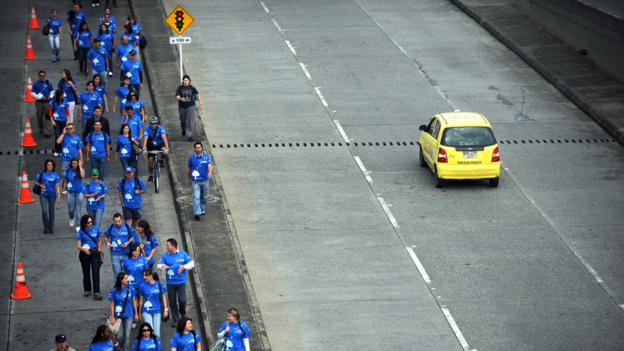Environment & Energy
Related: About this forumFive of the most radical car-free city experiments (BBC)
By Stephen Dowling
Plagued by record levels of air pollution last week, authorities in the French capital decreed that cars whose number plates end in an odd number were only allowed to be on the road one day, with even-numbered cars allowed the following day. The scheme was in response to pollution levels hitting 180 microgrammes of PM10 particulates per cubic metre, more than double the safe limit of 80.
Under emergency regulations, 700 police took to the streets from dawn to ensure that only cars and motorbikes bearing correctly numbered plates were being driven. After just one day the scheme was ended, with authorities saying it had had a marked effect on air quality.
The French capital is the latest city to limit the number of cars on the street, either to limit air pollution, or to free up the streets from lane-clogging congestion. It has led to some novel attempts to try and create car-free streets – and some equally ingenious ways to break the rules by drivers determined to stay behind the wheel.
Mexico City, Mexico, 1989
In 1989, officials in Mexico City prevented cars from driving on a particular day of the week. But the scheme backfired – those who could afford it bought another car to use on ban days, and the amount of driving actually went up. What’s more, many of these cars were older, and more polluting. A report by the World Bank found that the ban did not create any of the intended benefits, while another paper from researchers at University of California, Berkeley found that air pollution levels actually went up.
***
Hamburg, Germany, from 2030
Copenhagen may put you at a financial disadvantage to drive a car, but the German port city of Hamburg may make it even harder to have a car in the first place. The city’s ambitious plan is to become car-free within two decades – and one way it wants to achieve that is by creating linked green spaces which would cover some 40% of the city. It could make the entire city traversable by bike or foot.
***
more: http://www.bbc.com/future/story/20140318-five-car-free-city-experiments
progressoid
(49,987 posts)
People walking on road in Medellin, Colombia (AFP)
http://www.bbc.com/future/story/20140204-can-a-city-really-go-car-free